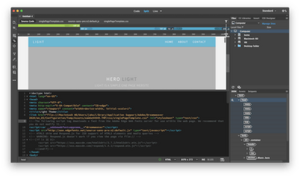Adobe Dreamweaver facts for kids

Adobe Dreamweaver 20.2 running on macOS Catalina
|
|
| Developer(s) | Adobe (2005–present) Macromedia (before 2005) |
|---|---|
| Initial release | December 1997 |
| Stable release | |
| Preview release |
Lua error in Module:Wd at line 1575: attempt to index field 'wikibase' (a nil value).
|
| Written in | C++ |
| Operating system | Windows 10 version 1703 and above, macOS 10.12 Sierra and above |
| Type | HTML editor, programming tool, integrated development environment (IDE) |
| License | Trialware software as a service |
Adobe Dreamweaver is a special computer program. It helps people create and design websites. Macromedia first made Dreamweaver in 1997. Later, in 2005, Adobe bought Macromedia and continued to develop the program.
You can use Adobe Dreamweaver on computers that run macOS or Windows operating systems. After Adobe took over, newer versions of Dreamweaver worked better with the rules for how websites should be made. These rules are set by the W3C. Dreamweaver also improved its support for modern web tools. These include CSS (for styling) and JavaScript (for interactive parts). It also supports various programming languages like PHP.
Contents
What Dreamweaver Can Do
Adobe Dreamweaver CC is a program for web design. It helps you develop and design websites. Dreamweaver has a special code editor. This editor makes writing code easier.
Helpful Code Editor Features
The code editor in Dreamweaver has many useful features:
- Syntax Highlighting: It colors different parts of your code. This makes it easier to read and understand.
- Code Completion: It suggests words or lines of code as you type. This helps you write faster and avoid mistakes.
- Real-time Syntax Checking: It checks for errors in your code as you write. You can fix problems right away.
- Code Hints: It gives you tips and suggestions to help you write correct code.
Working with Website Files
Dreamweaver lets you create your website files on your own computer. Once your files are ready, Dreamweaver helps you send them to a web server. A web server is where your website lives online. It uses special ways to send files, like FTP. Dreamweaver CS4 also worked with Subversion (SVN). This is a system that helps teams manage changes to their code.
Supported Programming Languages
Since version 5, Dreamweaver has helped with many programming languages. It highlights the code for them. This makes it easier to work with different parts of a website.
Here are some of the languages it supports:
- ActionScript
- Active Server Pages (ASP)
- C#
- Cascading Style Sheets (CSS)
- ColdFusion
- Extensible HyperText Markup Language (XHTML)
- Extensible Markup Language (XML)
- HyperText Markup Language (HTML)
- Java
- JavaScript
- PHP
- Visual Basic (VB)
- Visual Basic Script Edition (VBScript)
- Wireless Markup Language (WML)
You can also add support for other languages if you need to. Code completion, which suggests code as you type, works for many of these languages.
Languages Dreamweaver Speaks
Adobe Dreamweaver is available in many different languages. This makes it easier for people around the world to use it.
Available Languages
Adobe Dreamweaver CS6 was available in these languages:
- Brazilian Portuguese
- Simplified Chinese
- Traditional Chinese
- Czech
- Dutch
- English
- French
- German
- Italian
- Japanese
- Korean (Windows only)
- Polish
- Russian
- Spanish
- Swedish
- Turkish
Special Features for Right-to-Left Languages
Older versions, like Adobe Dreamweaver CS3, had a special version for the Middle East. This version allowed users to type text in languages like Arabic or Hebrew. These languages are written from right to left. The program made sure the text showed up correctly, even if it mixed English (left-to-right) with Middle Eastern text.
More About Adobe Products
- Adobe Creative Cloud
- Adobe Muse
- Web application
See also
 In Spanish: Adobe Dreamweaver para niños
In Spanish: Adobe Dreamweaver para niños

